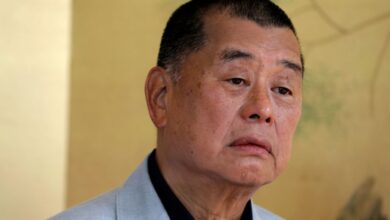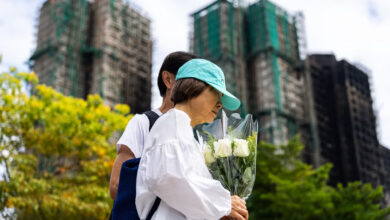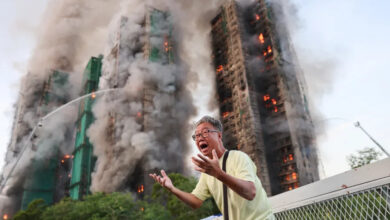
A year since pro-democracy protests brought Hong Kong to a standstill, organisers admit China's communist leaders show no sign of budging on reform, but say a spark could reignite the movement.
Traffic now thunders along the highway once occupied by tens of thousands of people calling for fully free leadership elections, and there has been little fanfare ahead of Monday's anniversary.
Frustration permeates the Umbrella Movement, a loose collective that took to the streets after Beijing said it would vet candidates standing for the position of Hong Kong chief executive in 2017.
Student leader Joshua Wong, 18, says the emotionally charged rallies were "a miracle".
"But even a miracle couldn't change the Communist Party," he told AFP.
Wong and his campaign group Scholarism have now turned to long-term tactics, including encouraging young people to enter public institutions and canvassing international support.
"The failure of last year's movement motivated me to conclude we need to fight for the right of self-determination," says Wong.
– 'Tipping point' –
Hong Kong has been governed under the "one country, two systems" arrangement since it was handed back to China by Britain in 1997.
It allows the city much more freedom than seen on the mainland, but there are growing fears that is being eroded.
Since the rally camps were cleared in December, activists have been brought to court in what they describe as a witch hunt.
There are also concerns over media freedoms after a number of attacks on journalists.
Few believe Beijing will budge on political reform any time soon — much less countenance a breakaway by Hong Kong.
"From the bottom up there is really not much one can do," says Yvonne Chiu, assistant professor at Hong Kong University's Politics and Public Administration Department.
"That's not going to change unless Beijing allows that to change, or Beijing changes itself."
China's central government claimed it was offering a compromise of sorts by allowing a popular vote for the Hong Kong leader in 2017.
But the electoral package was voted down by pro-democracy lawmakers, who were unhappy with the restrictions, leaving the territory with its existing system where the leader is chosen by a pro-Beijing election committee.
"Unless the (pro-democracy) opposition in the legislative council changes, I don't think we can restart the political reform process in the near future," Ng Chau-pei, spokesman for the pro-Beijing Alliance for Peace and Democracy, told AFP.
City Chief Executive Leung Chun-ying, his deputy Carrie Lam and parliamentary speaker Jasper Tsang said they were not available for interview.
– 'Critical minority' –
Democracy campaigners may feel they are banging their heads against a brick wall, but Chiu says the Umbrella Movement achieved an important shift.
"It looks like Beijing won, but the cost was that you have a much more politically engaged population, which is not at all what they wanted," she told AFP, adding that more radical elements could come to the fore if tensions flared again.
Both Wong and fellow protest leader Benny Tai agree that political awareness among the young generation was the movement's biggest achievement.
"We have achieved a critical minority," says law professor Tai, co-founder of pro-democracy group Occupy Central.
"We need to promote the idea of civil disobedience, of universal suffrage, in the community… I believe that the tipping point will come."
Chiu says a catalyst — the jailing of a prominent activist or an unpopular government policy — could spark the movement back into life.
But it would need a common aim.
"People are exhausted. For them to make a big effort again, they (would) want to have a little more clarity on what the goal is," she said.
– Time to reflect –
Monday marks the day when Occupy Central was launched following more than a week of student protests.
Thousands joined the already large crowds after police fired tear gas in the afternoon of September 28, a move that shocked the public and galvanised the Umbrella Movement — named after the umbrellas protesters carried to shelter from sun, rain, tear gas and pepper spray.
From then on, the centre of the city became an entrenched rally camp that transformed into a tent city complete with study rooms, exercise areas and artworks.
There will be a gathering at the main site on Monday afternoon but organisers say it is not a protest, more a "reflection".
While momentum may have slowed, some optimism — and a desire for change — remains.
"We didn't win last year," says Wong.
"But we can win the war."




